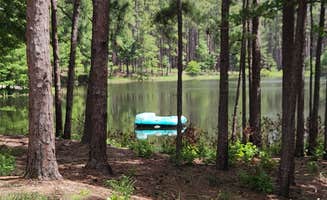Dispersed camping near Brookeland, Texas offers rustic backcountry experiences amid the piney woods of East Texas. The surrounding Sabine and Angelina National Forests contain several primitive camping areas situated on public lands managed by the U.S. Forest Service. These sites typically lack developed facilities and require campers to be self-sufficient with water, waste management, and other essential supplies.
What to do
Fishing opportunities: Sexton Pond Dispersed area provides access to fishing spots where campers can try their luck throughout the day. According to one visitor at Sexton Pond Dispersed, "I got lucky enough had the place to myself for almost 2 weeks, give or take the few groups that tried to tough the biting fish."
Wildlife observation: The national forest surrounding Brookeland harbors diverse wildlife including white-tailed deer, wild turkeys, and numerous bird species. Campers often report spotting wildlife during early morning and evening hours when animals are most active.
Hiking exploration: Multiple unmarked trails wind through the forest areas near dispersed camping locations. The terrain consists primarily of pine forest with moderate elevation changes, making most routes suitable for casual hikers.
What campers like
Privacy and seclusion: The dispersed camping areas around Brookeland offer solitude not found at developed campgrounds. One camper at Sexton Pond Dispersed noted, "If looking to be near a campground but still out on your own then this is the place."
Established fire pits: Several campsites contain basic fire rings for cooking and evening campfires. "There are a few fire pits spread out. We were the only ones here," reported a visitor who appreciated the existing facilities.
Fishing access: The Angelina River/Hwy 59 Dispersed area attracts anglers seeking specific seasonal catches. One review mentions, "You can float the river most either way overall. Sand bass is a fav when in season."
What you should know
Road conditions: Access roads to dispersed sites can deteriorate during wet weather. Most sites require navigating unpaved forest roads that may not be suitable for low-clearance vehicles after heavy rain.
Limited facilities: No drinking water, restrooms, or trash service exists at these primitive sites. Campers must bring all necessary water and carry out all waste according to leave-no-trace principles.
Seasonal considerations: Summer temperatures regularly exceed 90°F with high humidity, while spring and fall offer more moderate conditions. Upland Island Wilderness Area and other dispersed sites become particularly challenging during summer months due to insects and heat.
Tips for camping with families
Water planning: Families require significant water supplies when staying at these primitive sites. Calculate at least 1 gallon per person per day for drinking and cooking, plus additional water for cleaning and hygiene.
Insect protection: The East Texas forest environment harbors mosquitoes, ticks, and chiggers, particularly from April through October. Bring appropriate repellents and check children regularly for ticks.
Emergency preparedness: Cell service remains unreliable throughout most Bouton Lake Camp and other dispersed areas. Families should bring a first aid kit, know the location of the nearest medical facilities, and have a communication plan.
Tips from RVers
Size limitations: Most dispersed sites accommodate smaller RVs and trailers rather than large motorhomes. Areas with tree cover may have low-hanging branches that restrict access.
Level parking: Bring leveling blocks as most dispersed sites lack prepared parking pads. The natural terrain often requires additional effort to achieve a level position for comfortable camping.
Self-containment: RVers must be fully self-contained when using dispersed camping areas near Brookeland. No dump stations or hookups exist at these locations, requiring careful management of holding tanks and resources.


